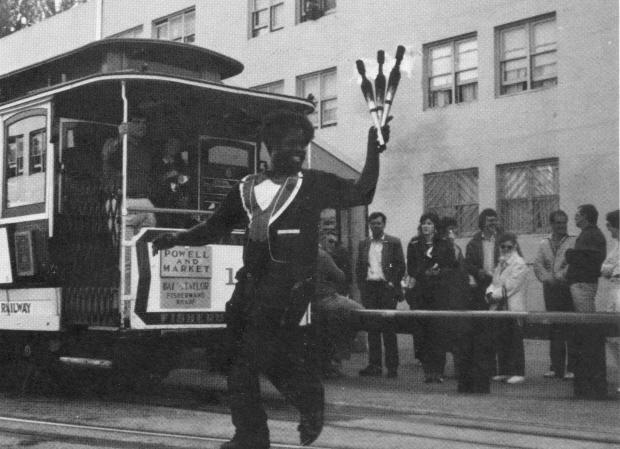
Ray flashes the grin for the cable car crowd. |
Page 17 Winter 1986 - 87
|
At
28, Smith is no ingenue to the streets. Born on Chicago's
South Side, he was orphaned, at 7 when both parents and two
He
was sent to Salem, Oregon,
So
at 15 he split back to Chicago and
Sweeping
floors and washing dishes were
about the only straight ways of making
a living open to a boy his age. It was a poor
neighborhood. It sure wasn't what he
wanted to do. On a street comer one day he watched a magician
perform. Fascinated, he started hanging out at the Magic Center,
under the EI tracks, at Wabash and
Randolph. Screwing up his nerve, he approached Lee Wade, the
owner, offering to sweep floors, wipe counters, whatever, in return
for lessons. Wade
gave him a job. For six months Smith
observed closely and practiced. "Boy did I practice, 4
to 5 hours a day until I could perform smoothly, naturally. After
a while I got good enough to try and sell tricks to kids,
Hell, here I was just a kid myself.
"I'd
put on a show, get 'em real excited l'd then say, 'If you wanna learn
this trick you gotta pay for it first. Then I'll show you how it's
done.' They'd usually come back moanin' the next day. 'Hey, that trick
won't work, gimme my money back.' 'Now,' I'd say, 'here's the real
trick. You gotta practice. It's gonna take time and it's not gonna be
easy."
And
life mimicking art, things have been pretty much the same for Smith.
During
all that solid career planning; performing remained his greatest
pleasure. He wanted to test that part of himself to lee if he had the
skill to make it in show business. Besides, the button-down shirt and
tie were beginning to chafe his neck.
San
Francisco's Fisherman's Wharf had often been mentioned often as a
place where street performers had the best chance. So he packed up and
moved to the City Beside the Bay. Jefferson Street, in front of the
Anchorage, became the theatre for his magic and balloon act. He'd
survived the first step.
One
Sunday while exploring Golden Gate Park, he happened upon a little
meadow with a lot of jugglers. Robert Nelson, the incorrigible
"Butterfly Man," was performing hat tricks and ball
routines. "Can you teach me that?" Nelson sent him home with
a primitive 3 ball cascade. He practiced. Next Sunday he returned
doing 5. Within 3 months he was doing 7. The bug had bit.
In
1983, at 24-years-old and juggling less than a year, this ghetto kid
entered
The
audience ate it up. The judges gave him 6th place. Stardom was
obviously going to be coy. The act was not going to make it on raw
talent alone. It needed a bit of polish if he was going to be able to
take it off the streets. If he was going to become the first black man
to win the U.S. Nationals.
So...
what could he do to make himself unique, to make himself stand way far
out from a whole lot of very slick performers. |

Ray flashes the grin for the cable car crowd. |